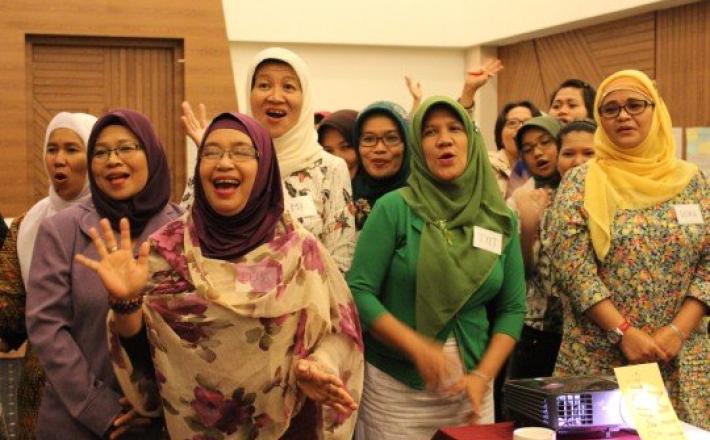Peacebuilding through parliaments
We look to our parliaments to represent us, adopt laws that protect our fundamental rights and freedoms, and distribute resources to those in need. In such ways, parliaments are uniquely positioned to promote gender equality and women’s empowerment. So why is it that they are so often absent from discussions surrounding the women, peace and security (WPS) agenda and its implementation?
The adoption of the United Nations Security Council Resolution (UNSCR) 1325 in 2000 acknowledged the inordinate impact war has on women, and the pivotal role women play in development, peace and security. Recent resolutions stressed the need for including women in peace talks, to prevent violent extremism and foster post-conflict reconstruction. We have learned that the probability of peace agreements lasting at least two years increases by 20 percent when women participate in the process. The 2015 Sustainable Development Goals recognize the links between gender equality, strong institutions, peace and security.
Despite these advances, implementation of UNSCR 1325 has been lagging. The Global Study on the Implementation of UNSCR 1325 cites the lack of funding as the most serious obstacle to implementing the WPS agenda. If we want to bridge the funding gap and guarantee that WPS commitments translate into concrete action, we will need to enlist the help of parliaments.
A report by the NATO Parliamentary Assembly revealed that in 17 of NATO member states, parliaments monitor UNSCR 1325 implementation through debates and hearings. Parliaments have the power to enact gender-responsive legislation, monitor whether sufficient funding is allocated to promote women, peace and security. They also ensure women parliamentarians have a substantial say in discussions regarding finance, defense, counter-terrorism, legal policy and justice.
In implementing the WPS agenda, parliaments’ transparent engagement with the media and women’s civil society organizations is essential. In Somalia, women’s networks are currently consulting with the government to ensure the 30 percent reserved seats quota, agreed-upon in 2012, is upheld in the upcoming elections. The Somali example demonstrates the capacity of civil society to advocate for inclusive political processes and hold parliaments accountable for WPS commitments.
Together with its partners, UNDP is contributing to important work that aims to promote the WPS agenda through parliaments. In 2015, UNDP hosted an International Conference of Women Parliamentarians in Algeria, bringing together 100 parliamentarians from 11 countries to exchange best practices in promoting women’s political participation. Among other achievements, the meeting launched the first Algerian Forum of Women Parliamentarians.
UNDP is expanding its efforts in this area by launching a new initiative that will advocate for greater leadership of women parliamentarians, strengthen parliamentary oversight mechanisms on gender equality and National Action Plans, and facilitate linkages between parliaments, media and women’s civil society. This initiative seeks to fill the current gap in WPS agenda implementation by strengthening parliaments to act as agents of peace and gender equality in their societies.
By Nika Saeedi, iKNOW Politics Expert, Policy Specialist on Gender, Political Processes and Peacebuilding at UNDP's Bureau for Policy and Programme Support (BPPS)
Source: UNDP

We look to our parliaments to represent us, adopt laws that protect our fundamental rights and freedoms, and distribute resources to those in need. In such ways, parliaments are uniquely positioned to promote gender equality and women’s empowerment. So why is it that they are so often absent from discussions surrounding the women, peace and security (WPS) agenda and its implementation?
The adoption of the United Nations Security Council Resolution (UNSCR) 1325 in 2000 acknowledged the inordinate impact war has on women, and the pivotal role women play in development, peace and security. Recent resolutions stressed the need for including women in peace talks, to prevent violent extremism and foster post-conflict reconstruction. We have learned that the probability of peace agreements lasting at least two years increases by 20 percent when women participate in the process. The 2015 Sustainable Development Goals recognize the links between gender equality, strong institutions, peace and security.
Despite these advances, implementation of UNSCR 1325 has been lagging. The Global Study on the Implementation of UNSCR 1325 cites the lack of funding as the most serious obstacle to implementing the WPS agenda. If we want to bridge the funding gap and guarantee that WPS commitments translate into concrete action, we will need to enlist the help of parliaments.
A report by the NATO Parliamentary Assembly revealed that in 17 of NATO member states, parliaments monitor UNSCR 1325 implementation through debates and hearings. Parliaments have the power to enact gender-responsive legislation, monitor whether sufficient funding is allocated to promote women, peace and security. They also ensure women parliamentarians have a substantial say in discussions regarding finance, defense, counter-terrorism, legal policy and justice.
In implementing the WPS agenda, parliaments’ transparent engagement with the media and women’s civil society organizations is essential. In Somalia, women’s networks are currently consulting with the government to ensure the 30 percent reserved seats quota, agreed-upon in 2012, is upheld in the upcoming elections. The Somali example demonstrates the capacity of civil society to advocate for inclusive political processes and hold parliaments accountable for WPS commitments.
Together with its partners, UNDP is contributing to important work that aims to promote the WPS agenda through parliaments. In 2015, UNDP hosted an International Conference of Women Parliamentarians in Algeria, bringing together 100 parliamentarians from 11 countries to exchange best practices in promoting women’s political participation. Among other achievements, the meeting launched the first Algerian Forum of Women Parliamentarians.
UNDP is expanding its efforts in this area by launching a new initiative that will advocate for greater leadership of women parliamentarians, strengthen parliamentary oversight mechanisms on gender equality and National Action Plans, and facilitate linkages between parliaments, media and women’s civil society. This initiative seeks to fill the current gap in WPS agenda implementation by strengthening parliaments to act as agents of peace and gender equality in their societies.
By Nika Saeedi, iKNOW Politics Expert, Policy Specialist on Gender, Political Processes and Peacebuilding at UNDP's Bureau for Policy and Programme Support (BPPS)
Source: UNDP